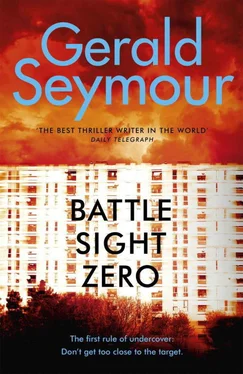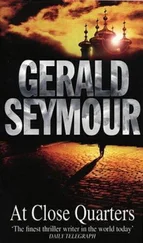‘Most of them do, look like nice girls,’ Gough said quietly.
She walked briskly along the pavement and Gough reckoned she had little tradecraft. Some of them doing the jihadi bit had a clear and prescient idea of how to avoid foot and vehicle tails. He did not think she had those skills. Most of the ones who did would have learned tradecraft in the top-grade universities offering the course: Her Majesty’s Prisons, either on remand or post-conviction. He thought she seemed confident, assured, and he did not sense that danger was on her list. Pegs had pulled out into the traffic and had kept her hazard lights on, which cut down the annoyance of the traffic building behind their vehicle.
Pegs murmured, ‘Like butter wouldn’t melt in her bloody chops.’
‘The immortal words of our fond allies, the Bundesgrenzschutz, in their manuals. ‘‘Shoot the women first’’, always a good idea. Can’t read them. Would she know that, Pegs?’
‘That she’ll be in the cross-hairs? I wouldn’t think so, no.’
They were grandstanding, had no useful place there other than to cast an eye on a target. Gough watched her head bob amongst other hurrying pedestrians. He had lost sight of the tail, and the car that followed her. She seemed to walk tall and with a purpose, then turned into a coffee bar. Pegs gave him the quick glance, would have known the answer but it was formal and for him to decide. A nod. She pulled into the fast lane and her hand had gone to the satnav controls and she did the business for London… she had looked so damned innocent, but innocence – Gough’s creed – was poor defence. The girl had looked pretty, but that wouldn’t help her, not in the big boys’, and big girls’, world. Too much to be getting on with, and all of it French, and all of it a potential disaster zone. Happy days… Gough’s hand rested on Pegs’ thigh, and she drove fast and well, and the pace had quickened, what he loved about his work, and her… And the threat loomed big: a gook in a black outfit and the weapon of choice in his hand, and the sound of screaming: what Gough had known all his working life.
September 1958
The digging had taken most of the morning, and tempers had worn thin.
The boy had now been in the custody of the Allamvedelmi Hatosag for almost three months. After the uprising and the reoccupation of Buda-Pest by the Soviet military, the local secret police had been given the task of searching out and arresting those who had been principals, and had tried to slide into anonymity. Men had dug several holes in the woodland in their search for the weapon, but he had been a poor guide for them. He barely saw where they dug, with their spades and pickaxes, because the beatings inflicted on him had virtually closed his eyes. They were puffed, the skin around them many-coloured, and cuts and scrapes covered his face, two front teeth were missing, and the gums still bled after a week. He had confessed. In the basement cells after one more session of beatings and kickings, he had admitted shooting the cowering official of state security, then taking away the rifle stolen from the Soviet liberators. Had also admitted using it the next day and the day after in an act of resistance, and then running from the city, going home, taking the Kalashnikov to the woods at his parents’ smallholding, and burying it. He had been dragged from his cell that morning and brought here, handcuffed, and had tried to identify the place, two years later, where he had dug. But the boy, through his puffed eyes could barely see a hand in front of him, let alone recognise an unmarked place in the ground.
He had confessed, and gilded the story, and tried to stump up excuses and mitigation, and hoped that, at the trial next week, he would be shown clemency by the court.
Travelling in a closed van, from the prison at Andrassy ut. 60, it had seemed a miracle to him when he had been pitched out near his parents, wooden house. Vaguely and indistinctly he had seen them standing by the porch, and a dog had run forward at the sight of him, but a boot had been aimed at it and it had backed off. He could not see whether his parents disowned him or tried to offer comfort. He knew nothing of the photographer. Did not know that a middle-aged man with a Leica camera was revered in his home city of New York by fellow photo-journalists, and that the picture of the revolutionary and the terrified secret policeman had made a whole magazine page and been widely admired… and had been sent by the Hungarian embassy in Washington to Budapest. Painstaking work in the headquarters of the AVH had identified him, and several others. The photographer was a necessary and valued tool in the hands of the counter-revolutionaries.
A spade struck metal.
He had not dug deep. A bare half-metre into the ground, and then had covered it, scattered leaves over the scar in the ground, and dumped manure from the family’s pigs, and had beaten that down with the flat of a spade. He supposed his father knew, but it had never been spoken of. The secret policemen had come at dawn, had kicked in the door and found him in his bed… The killing of their colleague had been long ago, and he had dared to hope that time had ebbed away, and secrets would not be solved. He should have gone, as others had, across the border into Austria, and turned his back on his country and on his parents, made a new life, but he had not.
Men were on their hands and knees, staining their trousers and manhandling wet sods of earth, and the rifle was exposed. He stared at it. His focus was on the barrel and the stock; he remembered how it had felt in his hand, its weight, and remembered the kick against his shoulder when he had fired on the thug who writhed on the ground. He had felt a power and a strength that had never been part of him before, that he had never felt since. He had been shown the work of the photographer, but did not recall seeing the man himself. He could see the faces of the men and women who had pressed close around him when he had shot the policeman, and could almost hear the clamour of jeering when the man had wriggled a few more times, hurrying to his death.
One of them took a handful of grass, bundled it together and started to scrub at the metal body of the weapon. The number was called out. Only the last digits… 16751… Another man flicked over pages on a clipboard, found what he searched for, and nodded, called that he had the match. A fast exchange – it was confirmed? Confirmed that this was the serial number of a weapon lost by a Soviet soldier in mechanised infantry. The magazine was still attached. Mud was brushed from the casing of the barrel and the selector lever and around the trigger, but some was still deeply embedded in the groove of the wooden stock. He looked for what he had done and saw where he had gouged out a small hole, his own record of killing the secret policeman. Another notch was dug the next day: he had fired on a tank commander in a turret and had claimed the hit, and argued with another boy as to which of them had taken the life: each had cut a mark on his own weapon. A short line, neatly cut, designated the Kalashnikov’s killing life.
The weapon was fired. The sound of it echoed among the trees and was heightened by the low ceiling of cloud, then it was made safe, and the magazine was detached. One of them said it was remarkable that the Kalashnikov worked – as it was boasted it would – after close to two years buried amongst the oak’s roots where the rain was sucked down. He was led away. His parents held each other but did not move from the porch; the dog had been put inside and he heard it scrabbling with its claws at the other side of the door. Perhaps, for amusement, if the dog had been free and able to bound towards him they’d have shot it. He was not thanked for his help. The rifle went ahead of him, carried with all the due care and attention of an item of near worthless junk.
Читать дальше












